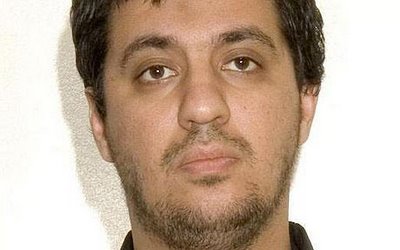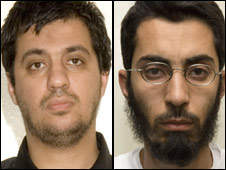Abu Beavis does prison (having already done al-Qaida in Iraq?)
 There seems to be a surprising lack of comment regarding Bilal Abdulla, convicted yesterday of his role as Abu Beavis in the Beavis and Abu Butthead do jihad plot and today sentenced to 32 years in prison. Surprising because, on the surface at least, Abdulla is the first verifiable example of genuine blowback against this country as a result of our involvement in the war against Iraq.
There seems to be a surprising lack of comment regarding Bilal Abdulla, convicted yesterday of his role as Abu Beavis in the Beavis and Abu Butthead do jihad plot and today sentenced to 32 years in prison. Surprising because, on the surface at least, Abdulla is the first verifiable example of genuine blowback against this country as a result of our involvement in the war against Iraq.Unlike the 7/7 bombers and others since who have blamed their actions on foreign policy, Abdulla is the only actual Iraqi to have so far played any discernible part in terrorism plots in this country. Born here, but having gone back to live in Saddam's Iraq when he was 5, he personally witnessed the sanctions regime which crippled the country, resulting in the deaths arguably of 500,000 children, a figure which the US secretary of state at the time, Madeleine Albright, described as worth it. It doesn't seem however that he was fully radicalised until the invasion in 2003, losing at least one friend from university in the sectarian violence which emerged in the anarchy created by the development of the insurgency. He blamed not just the Americans, but the Shia also, according to one of his friends in Cambridge being fully supportive of sectarian warfare, as long as it targeted Iraq's long subjugated majority.
At the end of 2004 he came to study, as mentioned above, in Cambridge. Here's where it's difficult to know when his full radicalisation took place: it's known that he was a member or at least associated with the radical Islamist group Hizb-ut-Tahrir, but HuT usually serves as a stepping stone between the caliphate which HuT supports and the murderous, worldwide caliphate which appeals to the takfirists of al-Qaida. In any event, it was in Cambridge that he met Kafeel Ahmed, an Indian born Muslim also apparently radicalised, but more by the usual methods of alienation and anger over the perceived treatment of Muslims worldwide, as well as the inequality and injustice often served to the Muslim minority in his homeland. Together they would they come up with the plot to target the Tiger Tiger nightclub, using incredibly amateurish bombs that failed to detonate, in one case because it lacked an oxidiser and in another because the wiring had come loose. When that failed, they settled on an apparent suicide mission which succeeded in as much as Ahmed died, but sadly for their chances of receiving the much debated 72 virgins, without killing anyone else.
Most of interest here though is just what links Abdulla had with the self-proclaimed Islamic State of Iraq, or as it was formerly known, al-Qaida in Iraq. Accounts seem to differ: the Guardian and BBC seem to discount the idea that Abdulla had anything more than a passing acquittance with the group, apparently in contact with some representatives of it online, and who might have helped, while the Times, quoting those all important security sources, claims that Abdulla during his time at Baghdad University came into contact with the forebears of al-Qaida in Iraq, even fighting with them before he left to come to Cambridge. This seems less believable: al-Qaida in Iraq at the time was still establishing itself, by no means yet the group which managed up until the middle of last year to control vast swathes of the "Sunni Triangle", still mostly a sect centred around Abu Musab al-Zarqawi. His group did not pledge allegiance to Osama bin Laden until late 2004, just the time that Abdulla was leaving to come to this country.
More feasible was the prosecution evidence that in May 2006 Abdulla had returned to Iraq and stayed there for three months. Their case was that it was during this time that he joined up with the now far more powerful al-Qaida in Iraq, known at the time as the Mujahideen Shura Council. Again, there is conflicting stories of just how involved he was: the Guardian reports that Scotland Yard found little evidence he was personally involved in the insurgency, while the Times' sources suggest that he had planned to be a suicide bomber, only for his handlers to decide that with his qualifications and passport he should instead target this country. The evidence that he was the first member of al-Qaida in Iraq to attack this country rests mainly on his will, which was directed to the "Soldiers of the Islamic State of Iraq", and on an audiotape, released only a couple of months back featuring the leader of the Islamic State of Iraq, in which the group very belatedly claimed responsibility for the London and Glasgow failed attacks, even ascribing the failure to a mistake made by the bomb-maker, which, as it turns out, is in at least one of the cases eerily accurate. At the time I was suspicious that the group should so belatedly, and mid-trial claim responsibility for the attack, especially as the ISI has been so emasculated over the last year, reduced to only a fraction of its former power. With the additional evidence now though, the claim looks far more credible.
Worth mentioning at this point is the fact that Abdulla was a doctor and Ahmed was an engineer, something that attracted more comment than it probably should have. While few of those dedicated to al-Qaida's ideological bent are as well qualified or with such bright potential prospects as Abdulla and Ahmed, poverty and poor qualifications are not generally good signifers of radicalisation, as the leaked MI5 document suggested. As Majjid Nawaz of the Quilliam Foundation pointed out on Newsnight, Osama bin Laden is an engineer, following in his father's footsteps, while Ayman al-Zahawiri is a doctor. Intellectuals with similar interests to Abdulla and Ahmed have often been well represented in the jihadi movement, it's just that as is often the case in other armies and terrorist groups, it tends to be those considered expendable that do the actual fighting. Hence Abdulla was considered too good to be a suicide bomber, or at least in Iraq, especially when at that point there was still more than enough willing young "martyrdom seekers" without such credentials.
Regardless of Abdulla's alleged links to al-Qaida in Iraq, it seems he received little in actual funding, if any, from the group itself. Nor did he apparently learn to make bombs whilst there; it was Ahmed instead who apparently set himself that task, experimenting in India. The bombs were originally described as similar to those used by AQI, but this was erroneous; AQI had resources far removed from patio gas canisters, hence their horrific and continued success at car and suicide bombs, and considering how unlikely it was that Abdulla would get his hands on actual explosives, it would probably have been wasted anyway. They instead settled on a plan which was always going to be difficult to pull off, and as a demonstration by the BBC's resident explosives expert showed, even if the bombs had gone off, it seems hardly likely that they would have resulted in the carnage which the prosecution itself claimed, let alone the "thousands" of deaths even more sensational press coverage has suggested. If they had succeeded in getting the 4x4 into Glasgow Airport, and the car bomb had successfully ignited, there could have been a very dangerous fire which could have quickly raged out of control. People could have died in the panic and smoke, but most likely not in the numbers claimed. This was a suicide mission where those most likely to die were the two men in the car, as it so proved.
There will obviously be debate about whether Abdulla did have links with AQI prior to coming to Britain, and where and when he moved beyond simple anger and hatred of American and Britons, from being a passive Islamic radical to being a radicalised jihadist prepared to kill people, but no one is denying that our role in Iraq had a substantial role in his radicalisation, perhaps even providing the catalyst that persuaded him that violence and murder could be justified as revenge for the calamity that Iraq was between 2004 and mid-2007 when he launched his assault. This should not be seen as being an argument for not involving ourselves in action like that in Iraq again, or as a veto on action because terrorists might attack us as a result, but as the evidence that has long been disputed by those in power who ignored those, both outside government and inside it who warned that the invasion of Iraq would result in more insecurity and more terrorism, not less, and that al-Qaida itself would win a massive propaganda victory, with more recruits than it could ever than have imagined. That has long been their modus operandi: they know they cannot possibly defeat this country or the United States, but what they can do is draw us in where they can attack and kill the "infidels" and "crusaders" far easier than they can ever manage in our own countries. Prior to the invasion of Iraq, al-Qaida in that country did not exist. We created it just as much as Abu Musab al-Zarqawi did.
The good or bad news, depending on your perspective, is that Abdulla, if he was involved with AQI, was poorly trained and that he picked a partner in jihad whose bomb making skills were just as poor. Undoubtedly however other Brits have fought with AQI, and might well have already returned, far better "educated" in the "university of terrorism" than they were, also potentially without wider links to al-Qaida central or other known extremists. While the threat remains often exaggerated, what is clear is that those who apparently slip through the net such as Abdulla are potentially far more dangerous than those trained in Pakistan/Afghanistan and known about. We cannot be blamed for the situation in Pakistan, however much grievance you imbibe; we can for what we have created in Iraq. Abdulla may be a one off; he might be just the beginning.
Labels: al-Qaida, Bilal Abdulla, foreign policy, Glasgow airport attack, Iraq, Iraq disaster, Islamic State of Iraq, jihadists, Kafeel Ahmed, radicalisation, terror, terrorism


